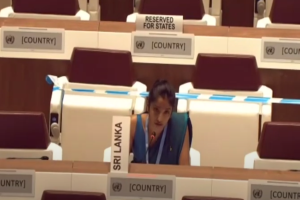
5 (a) An exploration of the potential challenges posed by emerging technologies in the area of lethal autonomous weapons systems to
international humanitarian law
3-13 July, 2021
Mr. Chair,
Excellencies, Distinguished participants,
At the outset, Sri Lanka would like to congratulate you on your assumption of the Chair of the Group of Governmental Experts on LAWS and for the continuous engagement with states on this issue. Let me assure you Mr. Chair, of the full support and cooperation of my delegation as we approach the preparation of the recommendations of the GGE to the 6th Review Conference of the CCW.
Sri Lanka aligns itself with the position expressed in the Working Paper submitted by Venezuela on behalf of the Non-Aligned Movement (NAM) on possible consensus recommendations.
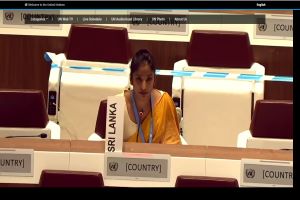
11 August 2021
Thank you Mr. Chair,
I will make two brief comments on section 3 before providing some comments on section 4. We fully support the retention of specific references to branches of international law in section 3.1 for reasons we have repeatedly mentioned in our previous statements and by other colleagues this morning as well.
Secondly, the willingness of programmers of autonomous weapon systems to ensure compliance with the existing legal norms and principles is a serious concern. Therefore, we support the inclusion of the word ‘development’ in section 2 as suggested by Austria and supported by other delegates.
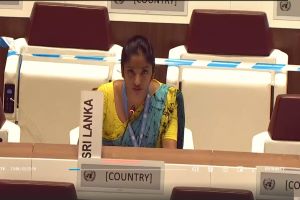
Sri Lanka fully supports the reference to international human rights law in the general considerations section. Given the possibility of autonomous technology to be used in situations of armed conflicts as well as in law enforcement situations, recognition of the relevance of international human rights law and criminal law is important. Principles of non-discrimination and human dignity are cardinal principles of international human rights law which have a direct relevance to our discussion today.
Secondly Sri Lanka supports a stronger emphasis on ethical considerations. While it is understood that ethical dimension is already included in the IHL principles, a separate paragraph on this issue, we believe is an important reinstatement. Decisions on human life are too important to be left to the blunt expedient of a mechanical judgment.
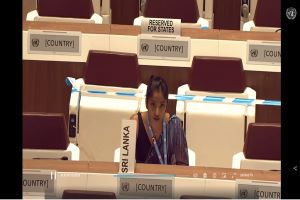
9 August, 2021
Mr. Chair,
We thank you for the draft elements paper on possible consensus recommendations circulated last Friday.
We have been engaged in discussions on technological, legal, military and ethical considerations of the development of autonomous weapon systems in this GGE forum since 2017. Over the years, a growing number of States have repeatedly flagged the alarming consequences of the challenges posed to fundamental IHL principles and humanity by the potential use of autonomous weapon systems and the urgent need for internationally agreed prohibitions and limitations.
During the discussion last Friday, some delegations re-iterated the need for our discussion to be based on the 11 guiding principles adopted in 2019, as reflected in the decision of the High Contracting Parties in 2019 , where it called upon the Group to consider the guiding principles, with a view to further develop and elaborate.
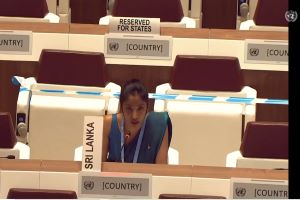
5 (a) An exploration of the potential challenges posed by emerging technologies in the area of lethal autonomous weapons systems to international humanitarian law
3 August, 2021
Mr. Chair,
Excellencies, Distinguished participants,
At the outset, Sri Lanka would like to congratulate you on your assumption of the Chair of the Group of Governmental Experts on LAWS and for the continuous engagement with states on this issue. Let me assure you Mr. Chair, of the full support and cooperation of my delegation as we approach the preparation of the recommendations of the GGE to the 6th Review Conference of the CCW.
Sri Lanka aligns itself with the position expressed in the Working Paper submitted by Venezuela on behalf of the Non-Aligned Movement (NAM) on possible consensus recommendations.
Since this session is dedicated to exploration of the potential challenges posed by LAWS to IHL, our remarks will be aimed at addressing this particular issue.
Madam President,
Sri Lanka believes that sports and international sporting events should serve as a platform to promote inclusiveness and cooperation among the community of nations. The importance of the Olympics as a significant global opportunity in this regard cannot be over-emphasised.
In 2018, Sri Lanka chaired the Social Forum of this Council which brought together many participants from around the world to discuss how sports and the Olympic ideal can contribute to the achievement of the 2030 Sustainable Development Agenda and human rights. We hope that the Council and all stakeholders will continue further action in this direction.
Madame President,
Sri Lanka takes note of the Special Rapporteur’s report on the Situation of human rights in the Palestinian Territories and wishes to express regret at the serious escalation in violence in the territory following evictions, demolitions, settlement expansion and settler violence. We deeply regret that the outbreak of violent hostilities in May caused wanton loss of many civilian lives. The long-term effects of such violence on infrastructure including water, sanitation and electricity will only lead to the suffering of the people of the Palestinian Territories.
We appreciate the work of the UN Relief and Works Agency (UNRWA) in responding to the humanitarian crisis in the Palestinian Territories and call on the international community to strengthen support for their activities. We also highlight the paramount importance of addressing the aggravated humanitarian situation in the Palestinian territories, including the provision of urgent healthcare including vaccines and therapeutics, and social and economic assistance to the populations affected by hostilities.
Sri Lanka re-iterates its consistent and principled position regarding the right of the Palestinian people to statehood and to the natural resources in their territory and re-iterates the importance of the early implementation of the relevant UNGA resolutions. We remain committed to supporting a negotiated settlement in line with the internationally agreed parameters of two states living side by side on the basis of the 1967 borders, which is key to achieving long term security, peace and prosperity.
I thank you
- Anti-Personnel Mine Ban Convention- Intersessional Meetings, 22-24 June 2021 Interventions by Sri Lanka
- Statement delivered by Sri Lanka during the Interactive Dialogue with the Special Rapporteur on the human rights of migrants at the 47th session of the Human Rights Council
- Statement delivered by Sri Lanka during the Interactive Dialogue with the Special Rapporteur on the right to health at the 47th session of the Human Rights Council
